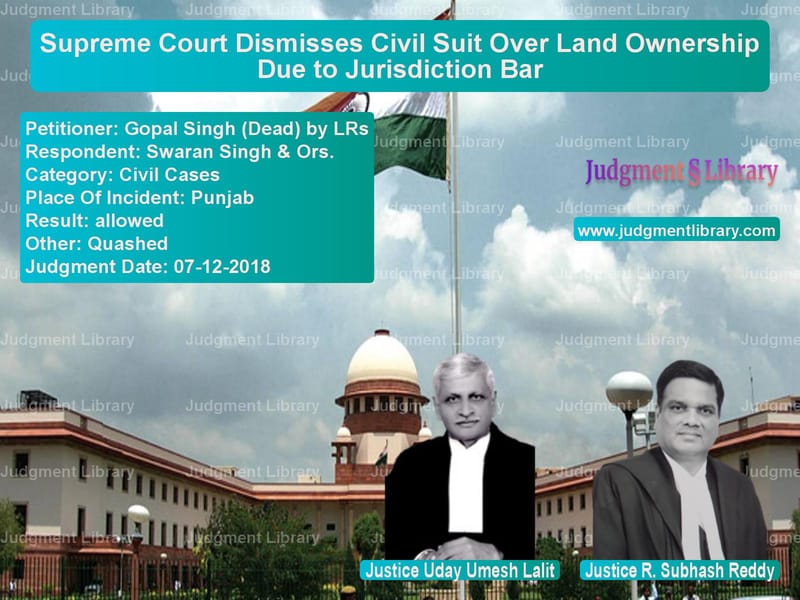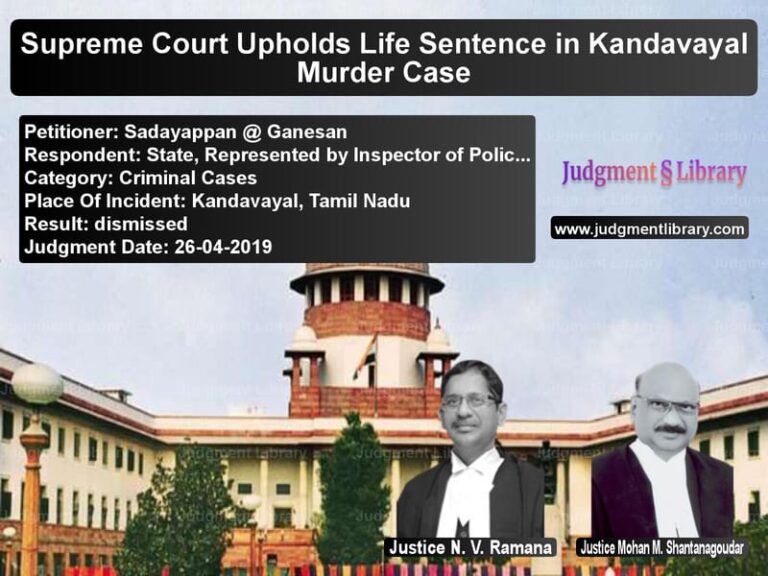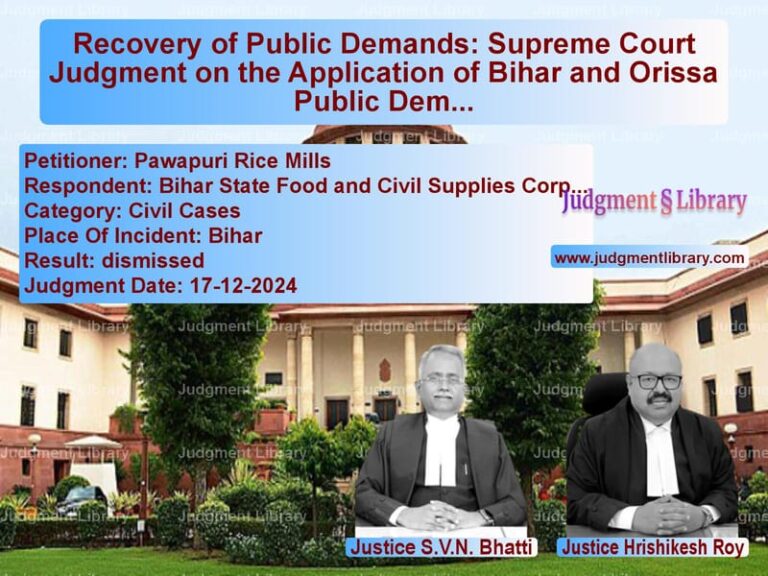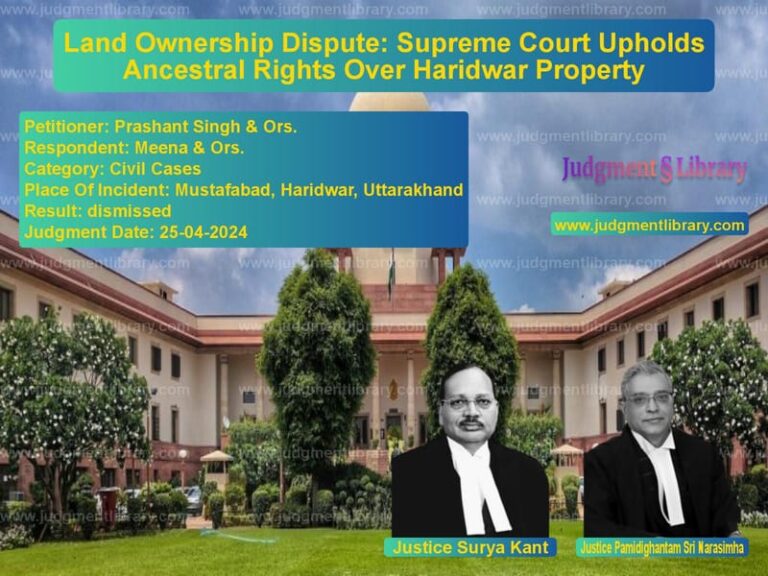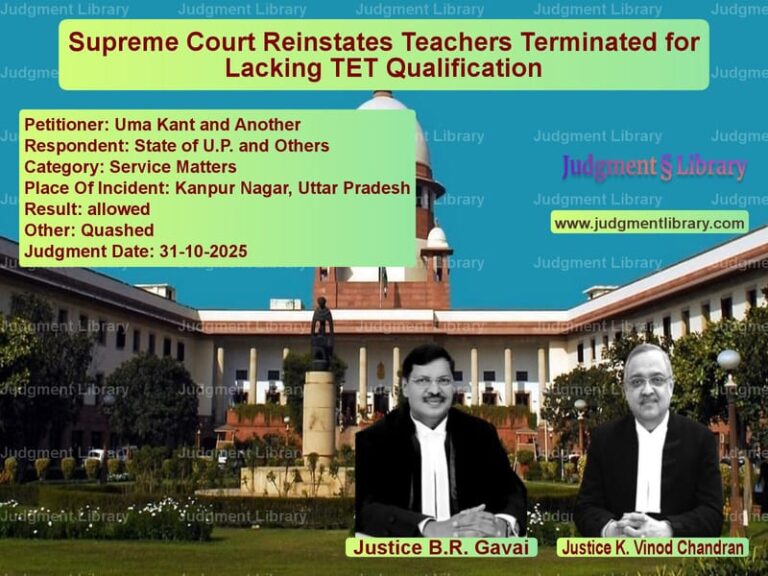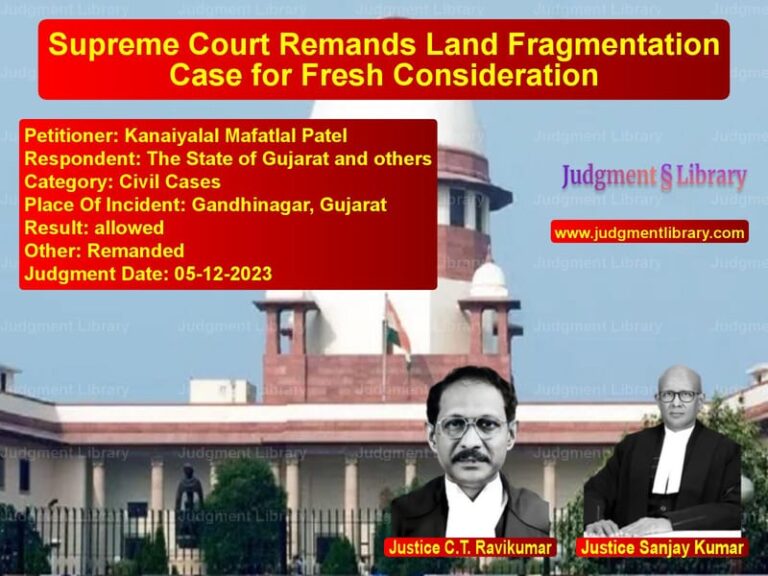Supreme Court Dismisses Civil Suit Over Land Ownership Due to Jurisdiction Bar
The case of Gopal Singh (Dead) by LRs v. Swaran Singh & Ors. is a crucial ruling concerning land ownership and the jurisdiction of civil courts in disputes arising from government land auctions. The Supreme Court ruled that the civil court had no jurisdiction to entertain the suit filed by the plaintiffs challenging the cancellation of a land sale under the Punjab Package Deal Properties (Disposal) Act, 1976. The Court held that any dispute regarding government land auctions must be resolved through the statutory process established under the Act, not through civil litigation.
Background of the Case
The case originated from an auction conducted under the provisions of the Punjab Package Deal Properties (Disposal) Act, 1976 (referred to as “the Act”). The disputed property was sold in a restricted auction to Mohan Singh on December 23, 1964. However, the sale carried a restriction preventing the buyer from alienating the land until the final repayment of the loan used to purchase the property or a period of ten years, whichever was later.
Since Mohan Singh violated this condition by transferring the land prematurely, the government initiated proceedings to resume the property. Initially, the sale was canceled in 1975, but after a legal challenge, the Punjab and Haryana High Court set aside the cancellation, requiring authorities to follow due process before taking further action.
Following the High Court’s directive, the Deputy Commissioner-cum-Chief Sales Commissioner reaffirmed the cancellation of the sale on March 28, 1985, and re-allotted the property to the appellant, Gopal Singh. The plaintiffs, claiming to be bona fide purchasers of the land from Mohan Singh, filed a civil suit challenging this cancellation and seeking a declaration of ownership.
Key Issues in the Case
- Whether the civil court had jurisdiction to hear the dispute regarding the cancellation of the land sale.
- Whether the plaintiffs, as alleged bona fide purchasers, had any legal rights over the land.
- Whether the order of the Deputy Commissioner-cum-Chief Sales Commissioner was valid.
Arguments of the Petitioner (Gopal Singh’s Legal Representatives)
The petitioners, represented by Senior Advocate Vikas Mahajan, argued:
- The sale was lawfully canceled due to the original purchaser’s violation of auction terms.
- The civil court had no jurisdiction over the matter due to the explicit bar under Section 16 of the Punjab Package Deal Properties (Disposal) Act, 1976.
- The plaintiffs had no valid title to the property, as Mohan Singh’s sale to them was void due to his non-compliance with the auction conditions.
- The validity of the cancellation order could only be challenged through statutory appeals under the Act, not through a civil suit.
- The suit was also barred due to the plaintiffs’ failure to serve a notice under Section 80 of the Civil Procedure Code (CPC) before initiating proceedings against the government.
Arguments of the Respondents (Plaintiffs)
The plaintiffs, represented by Senior Advocate Neeraj Jain, countered:
- They were bona fide purchasers of the land and had paid valuable consideration for it.
- Their ownership should be protected under Section 41 of the Transfer of Property Act, 1882, which safeguards bona fide purchasers.
- The cancellation order issued by the government in 1985 was arbitrary and should be subject to judicial review by the civil court.
- Similar cases had been decided in favor of bona fide purchasers, and their rights should not be unfairly extinguished.
Supreme Court’s Observations
The Supreme Court examined the legal provisions and judicial precedents related to land auctions and the jurisdiction of civil courts. It made the following key observations:
1. Bar on Civil Court Jurisdiction
The Court held that Section 16 of the Act explicitly barred civil court jurisdiction over disputes arising from government land auctions:
“Every order made by any officer or authority under this Act shall be final, and no Civil Court shall have jurisdiction to entertain any suit or proceeding in respect of any matter which the State Government or any officer appointed under this Act is empowered to determine.”
Given this statutory provision, the Court concluded that the civil court had no authority to entertain the plaintiffs’ suit.
2. Plaintiffs Had No Valid Title
The Court ruled that since Mohan Singh had violated the auction conditions, his sale to the plaintiffs was illegal. It stated:
“The plaintiffs’ claim of ownership stands on an invalid transaction. When a transaction itself is void, subsequent purchasers cannot claim legal ownership over the land.”
3. Suit Was Barred Due to Lack of Notice Under Section 80 CPC
The Court found that the plaintiffs had failed to serve the mandatory Section 80 CPC notice to the government before filing the suit:
“The failure to serve a Section 80 CPC notice is a fundamental procedural defect, rendering the suit unsustainable in law.”
4. High Court’s Error in Interference
The Supreme Court noted that the High Court had wrongly interfered with the appellate court’s decision. It stated:
“Once the first appellate court had correctly applied the law and held the suit barred, the High Court should not have overturned its decision without addressing these fundamental legal bars.”
Supreme Court’s Judgment
The Supreme Court ruled:
- The civil suit was barred under Section 16 of the Act.
- The plaintiffs had no valid legal claim to the land.
- The failure to issue a Section 80 CPC notice further rendered the suit untenable.
- The High Court’s decision was set aside.
- The trial court’s ruling in favor of the plaintiffs was overturned.
- The plaintiffs’ suit was dismissed.
Impact of the Judgment
This ruling has significant implications:
- Reaffirming Statutory Jurisdiction: The decision reinforces that disputes arising under the Punjab Package Deal Properties (Disposal) Act must be resolved through statutory channels, not civil courts.
- Protecting Government Land Auctions: The judgment upholds the government’s authority to regulate and enforce conditions in land auctions.
- Limiting Civil Court Interference: It sets a precedent restricting civil courts from intervening in cases governed by specialized statutes.
- Emphasizing Procedural Compliance: The case underscores the necessity of serving Section 80 CPC notices before suing the government.
Conclusion
The Supreme Court’s ruling in Gopal Singh (Dead) by LRs v. Swaran Singh & Ors. clarifies that land ownership disputes arising from government auctions must be resolved within the statutory framework provided by the Punjab Package Deal Properties (Disposal) Act, 1976. The judgment upholds the principle that civil courts cannot interfere in matters where the law provides a specialized dispute resolution mechanism. This decision serves as a critical precedent in land law, ensuring that statutory protections for government land auctions remain intact.
Petitioner Name: Gopal Singh (Dead) by LRs.Respondent Name: Swaran Singh & Ors..Judgment By: Justice Uday Umesh Lalit, Justice R. Subhash Reddy.Place Of Incident: Punjab.Judgment Date: 07-12-2018.
Don’t miss out on the full details! Download the complete judgment in PDF format below and gain valuable insights instantly!
Download Judgment: Gopal Singh (Dead) b vs Swaran Singh & Ors. Supreme Court of India Judgment Dated 07-12-2018.pdf
Direct Downlaod Judgment: Direct downlaod this Judgment
See all petitions in Property Disputes
See all petitions in Landlord-Tenant Disputes
See all petitions in Specific Performance
See all petitions in Judgment by Uday Umesh Lalit
See all petitions in Judgment by R. Subhash Reddy
See all petitions in allowed
See all petitions in Quashed
See all petitions in supreme court of India judgments December 2018
See all petitions in 2018 judgments
See all posts in Civil Cases Category
See all allowed petitions in Civil Cases Category
See all Dismissed petitions in Civil Cases Category
See all partially allowed petitions in Civil Cases Category

